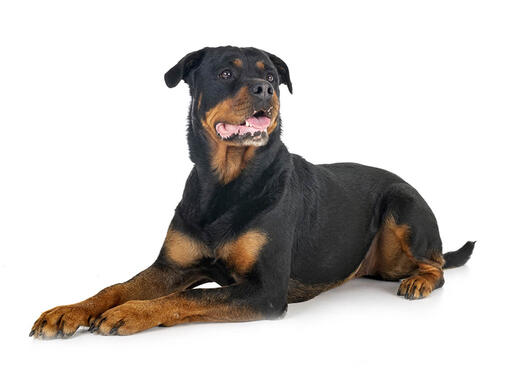
Rottweiler
A descendent of Roman drover dogs, the Rottweiler was selectively bred by the Germans for his herding and guarding instincts. Calm, confident and courageous with great intelligence and a willingness to work, the Rottweiler loves people but does not welcome strangers without proper introduction. Rottweilers need obedience training and socialization as well as daily exercise. Their coats require minimal grooming.
DID YOU KNOW? The Rottweiler’s name was derived from a German town, das Rote Wil.
The need-to-know
- Dog suitable for experienced owners
- Extra training required
- Enjoys active walks
- Enjoys walking one to two hours a day
- Large dog
- Minimum drool
- Requires grooming once a week
- Non hypoallergenic breed
- Chatty and vocal dog
- Guard dog. Barks, alerts and it's physically protective
- May require training to live with other pets
- May require training to live with kids
Personality

While they are not dogs who usually show their feelings, even with their owners, they are unconditionally loyal to their handlers and their families and will naturally defend them and their property. A popular breed with unscrupulous breeders, it's important to find a well-bred, well-socialised pup, as temperaments can vary. The importance of socialisation and training from an early age cannot be overstressed! This breed is not suited to the novice/inexperienced owner.
History and Origins

Country of Origin: Germany
The breed’s ancestors were the mastiff-like, cattle-herding dogs of the ancient Romans who accompanied their armies as they swept across Europe. Some of these dogs were left behind when the army moved on, and in Germany, they bred with local sheepdogs and produced the Rottweiler. The Rottweiler was originally known as the Rottweiler Metzerhund - which translates as the Butcher’s Dog from Rottweil (a market town in South-West Germany). The breed would mostly help move cattle on the way to slaughter but also worked as a livestock guardian and a property guard. They would also protect their owner who, after selling his wares, would be a target for thieves and bandits who would try to rob him. The Rottweiler made sure they didn’t!
Nutrition and Feeding

Large breed dogs, as well as having large appetites, benefit from a different balance of nutrients including minerals and vitamins compared to smaller-breed dogs. Rottweilers are also prone to bloating and stomach problems. Smaller, more frequent meals can help minimise this risk.
Exercise

Rottweilers need both exercise and training - and plenty of it to keep them happy and healthy. They enjoy long walks in the countryside, and a well-trained and socialised Rottweiler will usually stay very close to their owner. Ensure your Rottweiler is well-socialised and friendly with other dogs before letting them off the lead - and supervise all interactions with other dogs. Some Rottweilers can be problematic with other dogs and may need to be kept on lead around others. For an adult, two hours of daily exercise is required to include training and brain games.
Ideal Owner

The Rottweiler would suit an experienced owner with a large property who wants a loyal one-man dog that they can enjoy training and socialising.
Other Information

Health and common issues
In common with many large breeds the Rottweiler dog may suffer from a specific stomach condition (gastric dilation volvulus) and hip dysplasia (a condition that can lead to mobility problems). Hip scoring of dogs prior to breeding is therefore important.
Space requirements
This is a large, active dog, who needs plenty of indoor and outdoor space, and a well-fenced garden. As he can guard territory from visitors, dog-free access to your front door or letter box for deliveries is important.
Training rottweilers
The Rottweiler is a powerful, active working dog and as such he needs an experienced, firm but fair, owner to make sure he gets all the socialisation and training he needs to be a safe and friendly member of society. With the right owner, they can be trained to a very high standard, excel in canine sports or blossom with a job to do – in other words be an unbeatable dog. But the amount of work needed to keep them mentally and physically stimulated, and adequately socialised, makes them high maintenance dogs for expert owners.
Best family dog breeds
Not an ideal family dog as while he is usually devoted to his own children, he can easily mistake the intentions of their friends. Plus, in his clumsiness, he can knock over small children. With training and socialisation, the Rottweiler may be able to live with older sensible children. While many dogs are traditionally thought of as being good with children, all dogs and children need to be taught to get on with and respect each other, and be safe together. Even so, dogs and young children should never be left alone together and adults should supervise all interactions between them.
Did you know?
While often the subject of bad press, Rottweilers can make fabulous working dogs and can excel in a variety of jobs. For example, Gunner, a search and rescue Rottweiler received the AKC Hero Dog Award for his lifesaving work at the World Trade Centre disaster in New York.